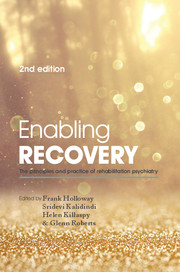Book contents
- Frontmatter
- Contents
- List of contributors
- List of figures, tables and boxes
- Preface
- Part 1 Setting the scene
- Part 2 Treatment approaches
- Part 3 Key elements of a rehabilitation service
- 16 Key elements of a rehabilitation service: overview
- 17 Rehabilitation in hospital settings
- 18 Community-based rehabilitation and recovery
- 19 Housing: a place to live
- 20 Work and employment
- 21 Peer support in mental health services
- 22 Leadership, management and service development in rehabilitation practice
- Part 4 Special topics in psychiatric rehabilitation
- Part 5 Future directions
- Index
20 - Work and employment
from Part 3 - Key elements of a rehabilitation service
Published online by Cambridge University Press: 02 January 2018
- Frontmatter
- Contents
- List of contributors
- List of figures, tables and boxes
- Preface
- Part 1 Setting the scene
- Part 2 Treatment approaches
- Part 3 Key elements of a rehabilitation service
- 16 Key elements of a rehabilitation service: overview
- 17 Rehabilitation in hospital settings
- 18 Community-based rehabilitation and recovery
- 19 Housing: a place to live
- 20 Work and employment
- 21 Peer support in mental health services
- 22 Leadership, management and service development in rehabilitation practice
- Part 4 Special topics in psychiatric rehabilitation
- Part 5 Future directions
- Index
Summary
Introduction
Historically, work and employment have played an important role in the rehabilitation of people with severe mental health problems. Work, employment and engagement in other rewarding activities are central factors in the recovery of people with mental health problems and their inclusion in broader society (Boardman et al, 2010). This chapter examines the importance of work and employment for people with mental health problems. It focuses on people with severe mental health problems and the supported-employment model, for which there is more evidence than for other models that it does help to increase the opportunities for this group to obtain open employment.
Work, leisure, employment and occupation
The traditional definitions of work emphasise that it is an activity that involves the exercise of skills and judgement and that it takes place within set limits prescribed by others (Bennett, 1970). Work is therefore essentially something you ‘do’ for other people. By contrast, in most leisure activities you can ‘please yourself’.
‘Employment’ is work you get paid for. Most childcare, housework, looking after elderly or sick relatives is clearly ‘work’, in the sense that the tasks and outcomes are defined by others, but they do not, at present, usually attract formal payments. This distinction between ‘work’ and ‘employment’ is very important in the context of mental health problems because the overwhelming majority of people with these problems want to ‘work’, that is, to be engaged in some kind of meaningful activity which uses their skills and meets the expectations of others. However, not all wish to be ‘employed’, with all the additional stresses and responsibilities that entails. Occupation may be considered as a general term that refers to engagement in activities, tasks and roles for the purpose of meeting the requirements of living.
The terms open or competitive employment are often used in the context of people with mental health problems or disabilities. These jobs are competitive in that they pay at least the minimum wage and the same wages that others receive for performing the same work. They are open jobs as they are based in settings alongside others without disabilities and are not reserved for people with disabilities (Drake et al, 2012).
- Type
- Chapter
- Information
- Enabling Recovery , pp. 308 - 323Publisher: Royal College of PsychiatristsPrint publication year: 2015



